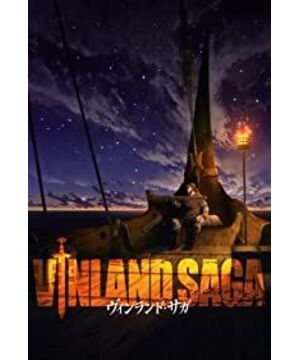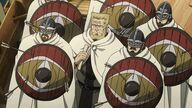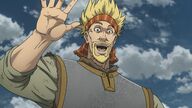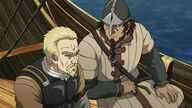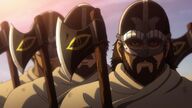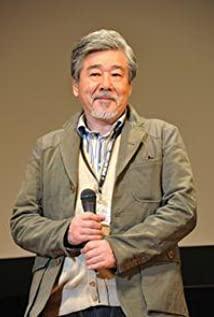I am an animation party / lost the situation player / giant blowing, first take a pit and write slowly.
This article mainly wants to have a well-founded praise for this work, and to analyze what elements a good work needs to have.
The first point is that although this work depicts war, it is centered on "love". Persona
I am very pleased that more and more excellent works in the past two years have begun to think and discuss with "love" as the core. The love here is different from the little love of "different treatment", it is an equal spirit of fraternity.
There is a lot of foreshadowing for this core work. Thors, as the father of the protagonist, the ceiling of combat effectiveness and spiritual benchmark, the respect for other people's lives he showed in the first three episodes, and the yearning for a better world (Venland) that does not require war to compete for resources, are all It embodies the spirit of fraternity. Putting this spirit on a character with great combat effectiveness is also an ingenious design, and the image of the character becomes plump and complex.
Thorz's death also made the whole character more complete and three-dimensional, and the behavior was logical, and also introduced the classic line of "true warriors don't need swords" with fraternity spirit throughout the play. Torfin's behavior was driven by Xiao Ai's love and admiration for his father, a blind act of revenge. Contrary to father's ideals
Then the characters such as the priest and the loyal minister Torukor are responsible for pointing out the difference between the little love and the big love. The priest denied that Torukor's love for the prince was a kind of discrimination, and it was only for the prince's feelings, so it was also a little love. It was this awakening that made the prince abandon his negative belief in God and escape from himself and evolve into a great emperor.
Even the second battle force included in this work is to find the meaning of "true warrior", and in fact, it is indirectly seeking great love.
The second point is to pave the way for character changes.
The one that has changed the most in this work is the emperor. When I first saw the great emperor who was still a princess, I was very curious about how such a character could become a late-stage ssr-level emperor. (Canute the Great was the first emperor to unite England)
As an aside, designing character changes is a high-risk thing, because if the space is not enough or the plot does not keep up with the character changes, the characters will be separated from the plot and suddenly "blackened" or "collapsed". Therefore, the simpler approach is that the protagonist maintains a relatively stable character, such as being positive, sunny and full of justice, and the development of the story revolves around the encounter of the protagonist. Many young man's routines are like this, using "companion power", "fetters", and "friendship" to advance the plot. If it is slightly monotonous, then the supporting characters will change after encountering the protagonist, which will become a harem manga?
The light modification category is a high incidence area of this kind of problem. And there are comics like Conan that seem to be stuck in an infinite loop. Compared with the giants who also have the blood of the bloody young man, the characters and the story stage are constantly changing, so the plot is also full of changes that make people look forward to it.
Going back to this work, the character who has the greatest influence on Knut is this priest who has lived for many episodes without me remembering his name at all! As an excellent half-year fan, episode 18 will usher in a wave of plot outbreaks (refer to Ghost Slayer next door, which is also the beginning of episode 19). The 18-episode literary drama of this work really made me blow up, first of all, Lagunal came to deceive tears. I don't know what happened, the op gave this chestnut a bento, and I still shed tears when I brushed it three times?
This stream of consciousness dialogue between the priest and the prince is the classic of this work. Comparable to the giant s3ep6 paragraph. The priest said two points. First, people have selfish desires. Only the dead can truly and selflessly dedicate their everything to others. Therefore, there is no real great love in human beings. Second, because people get Wisdom leads to misfortune, and suffering in life stems from original sin.
Even an idiot could see how negative this thought was. No wonder the priest drank every day to paralyze himself. Besides, Thors, the only one who showed great love, was dead. The Great Emperor finally woke up from his self-paralysis, and realized that God will not come to save the world, and the paradise after death is also an illusory fantasy. Since people's disputes and death come from chaos, then the order of this world must be readjusted. On this land, a paradise of human beings is built.
So far, Knut has completed the transformation and began to enter the second form. At the end of the season, we went back and sorted out the important points of the change of the emperor, joined the team of Asherat, witnessed the death of 62 villagers for his own survival, the death of the loving father Togunar, realized that God does not have mercy on the world, Witness the death of father and Asherat. The plot shapes the characters, and the characters drive the plot. formed a good relationship
Looking back at this classic stream of consciousness dialogue, its success is not due to the ideas it expounds. Only when the plot in the early stage is reasonable and the atmosphere in the later stage is sufficient, will the audience master think about the deep meaning of an obscure plot. Therefore, the success of this paragraph also represents the success of the structure of the whole story.
The third point is some reflections and discussions on religion.
This is also relatively rare. Japan is a country that has a cleanliness addiction to religion. Christianity has been persecuted, and Islam is not even allowed to enter. In fact, a discussion of religion is a discussion of philosophy.
This work depicts different understandings of religion from multiple angles
Fourth point, excellent characterization.
Counting down the protagonists of this season are three Torfin, Asherath and the prince.
Main supporting roles, Torfin related: father, Torukor, mother, sister, Leif; Asherat related: watch wheel; Prince related: Laguna, priest, King Swain.
There are also a lot of secondary supporting roles in this work, but the characters who have appeared on the camera can leave an impression, and can complete the two tasks of shaping the characters and promoting the plot within the limited space. Prove that every shot of the animation is very efficient. As a group drama, it is also very necessary.
View more about Vinland Saga reviews


